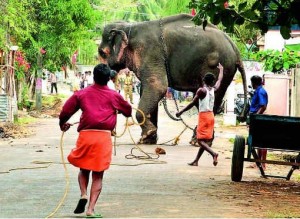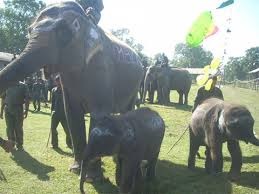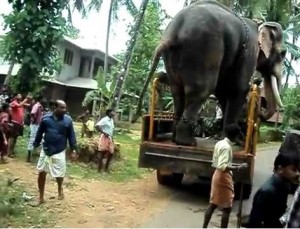Indian Supreme Court, warned and ordered on 14th May 2015, Elephants should be used in festival processions only after sticking to all existing norms, notices have been to Animal Welfare Boards, elephant owners and those who are found flouting norms would be dealt sternly and violators charged with custodial sentences and bail will be denied. Festival committee members and elephant owners could be charged with contempt of court.
The court was hearing a plea submitted by a Bengaluru-based organization, who had pointed out that torture of elephants in the name of temple procession was violation of Wildlife Protection Act.
Recent instances of captive elephants running wild and causing fatalities during festival processions, the Elephant Welfare Association had issued various guidelines, which should be strictly followed by the handlers of elephants. Parading of elephants in ‘musth’, prolonged processions, cruelty at the hands of mahouts and lack of food and water are the main reasons for most of the accidents. Even the most obedient elephant may turn violent during the period of ‘musth’. And smell of the ‘musth fluid’ may cause irritation for other elephants. So never underestimate the danger,” said Dr. K.C. Panicker, secretary, Elephant Welfare Association.
All elephants participating in day time processions should be given a cool shower before the event, and to overcome any provocation from people, barriers should be erected.
Temples in India, have a long history and tradition of keeping elephants. Some temples keep elephants as Elephants, in addition to being made to continuously bless people, and made to stand for long hours on concrete surface. The shelters provided to them are very small, closed, with no or less ventilation. The food coming primarily from devotees was restricted to a few varieties and biased towards high calorie values. Even with good intentions of offering food for elephants, there are no controls for hygienic status of food given by the devotees. Elephants are made to walk to reduce the regular routine of standing in one place for a long time; however the scope available for them to walk is only on tar or metal roads within crowded or congested city limits. Most temple elephants suffer from isolation, a lack of space in living conditions and have limited arrangements for exercise, bathing and interaction. Temples should have exclusive housing with mud floors, high roofs, ventilation, and good drainage. It should be made mandatory for temples to change the floor of their elephant enclosures to a more natural earthen or sand floor .At least during the day the animal should be kept on mud flooring or else alternative housing with mud or sand floors should be provided. The animals should sleep on natural flooring and they should be in an area where it is possible for them to release body heat during the night.



